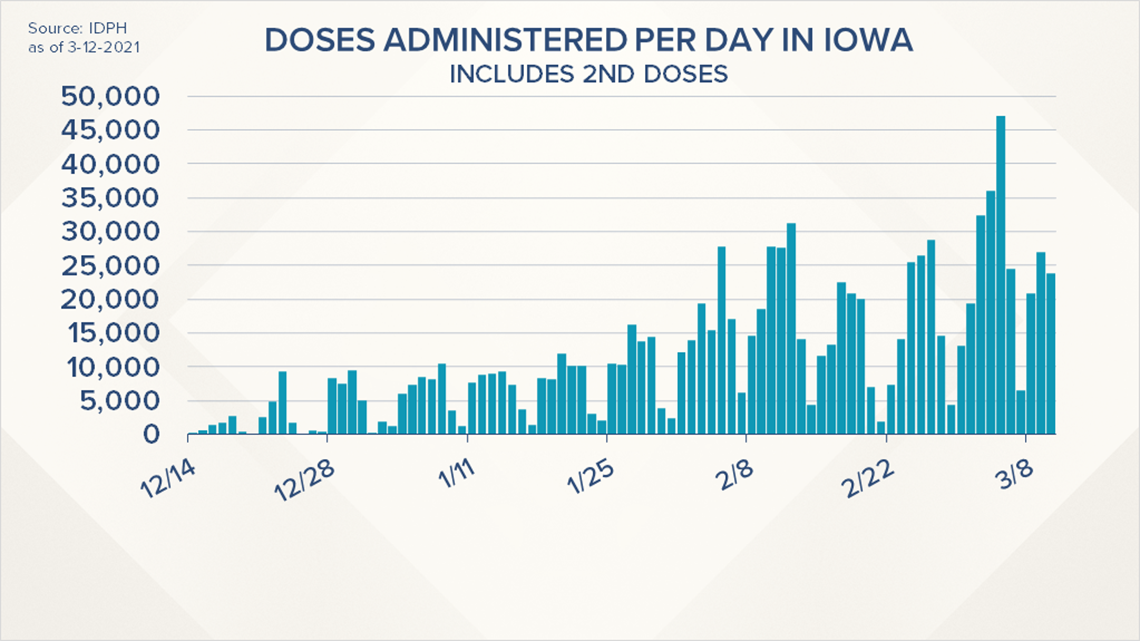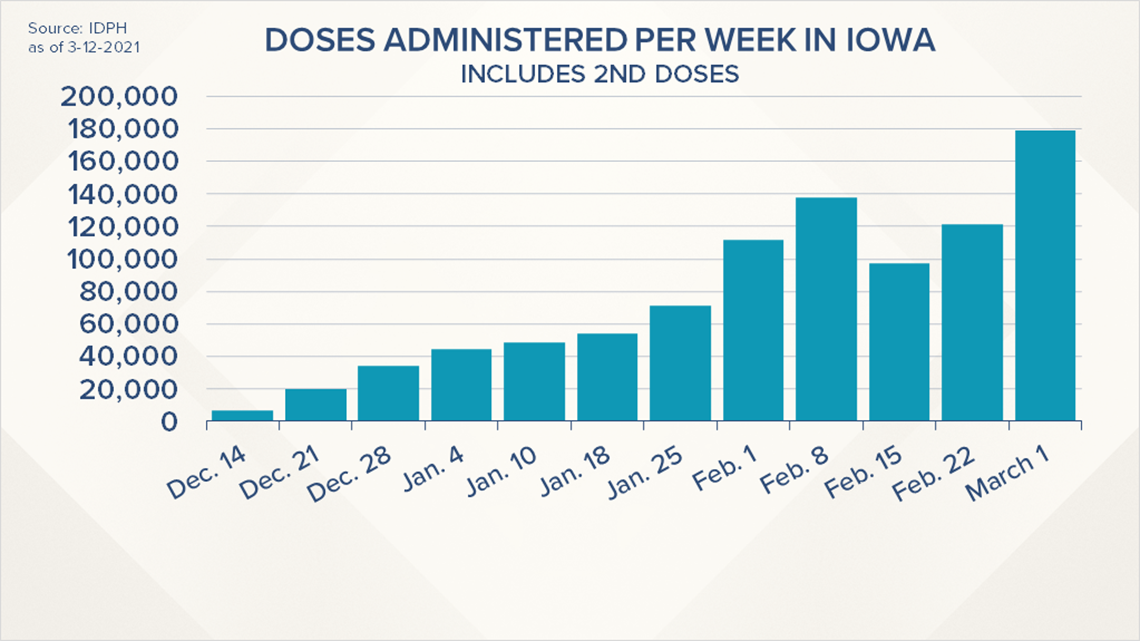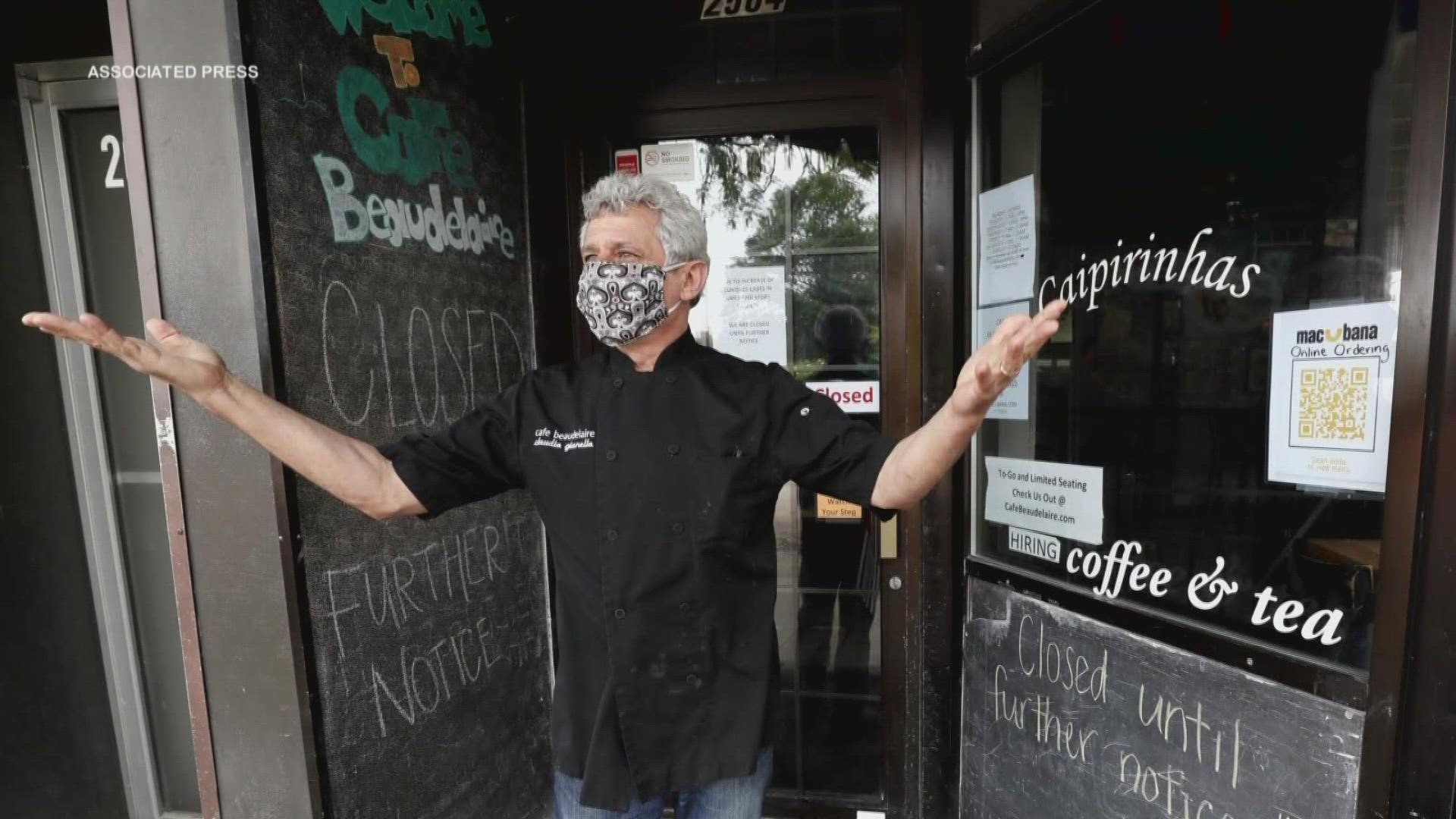IOWA, USA — Before COVID-19 uprooted our lives, Iowa's economy was heading in a promising direction to start 2020.
By March 17, 2020, thousands of employees were laid off or turned their homes into office spaces.
By April 2020, more than 58,000 Iowans filed for unemployment.
It was about "pivoting", "adapting" or "weathering the storm"— but none of it was easy. Many are still without a job. Many (like most of Local 5's staff) are still working from home.
But in the middle of the seemingly-endless bad, hope sprouted in the form of a vaccine. And from one vaccine, three, with a fourth one just within our grasp.
As of 1:00 p.m. Friday, more than 1 million doses have been administered in Iowa.
In the last episode of "Coronavirus Cause & Effect," Local 5 looks back at the fall of the economy and the hope for the future.
Watch complete "Coronavirus Cause & Effect" episodes
Ames resident finds a way to make working from home work for him
The idea of working from home is nothing new, but the pandemic caused it to be more widespread and impact sector that traditionally would have never consider sending their employees home to work.
Paul LaFleur, a civil engineer from Ames, was one of the thousands of Iowans who started working from home early in the pandemic. As a result, he's had to find a way to re-engineer his home and his daily routine.
"The boundaries between work and home have definitely blurred," said LaFleur as he took Local 5 on a seemingly nostalgic drive to the office. Even though the drive was short, LaFleur said it was important.
"I could shift from my home mental to-do list to my work mental to-do list," he said.
Now, heading to work for LaFleur means heading downstairs to his basement.
"At the beginning, I was almost in denial. This is only going to be a week or two. We'll be back to traveling. We'll be back to going on-site visits," he recalled.
As it became clear to LaFleur that he wouldn't be heading back into the office any time soon, he set out to create a workspace.
It started with simple things like getting some new computer monitors and plastic matt to protect his carpet.
Then, he moved on to more substantial upgrades.
"The WIFI signal was too weak, and it didn't work," LaFleur said.
That's when the drilling started. LaFleur had to run wires through the walls and floors to reach his computer. Then, when his wife came home to work, she needed a wired connection, too. That meant more wires.
On days when LaFleur and his wife worked from home, the two learned what it would be like to work together.
"We have different working styles. And we're both really loud. We both just have loud voices. When we're on meetings and I hang up, she'll be like, "Wow, you were really loud,'" he said.
Changes like these could have long-term impacts on the workplace.
"As we go through this transition, back to work is an option. Hybrid work schedules could also be an option," said Kevin Crowley, chief operating officer at NAI Iowa Realty Commercial.
Crowley also says there's lots of uncertainty.
"There's studies that say productivity is up. There's studies that say productivity is down. Some people are really comfortable in there setting at home. While others really want to go back to work," he said.
And in that LaFleur is torn because working from home has meant more time with his wife and kids.
"They hang out and just be around me. It's nice to have that time with them. Because I know they're going to be gone in a year and half of to college, and they're going off to their own adventures, and I wont have that time with them. So, I'm glad to have it now," he said.
'Don't forget about us' | Ingersoll Avenue businesses push through pandemic thanks to loyal customers
Business' doors on Ingersoll Avenue in Des Moines are donned with signs that say "masks required."
Maya Boettcher, the owner of event planning service Wildflower, said the pandemic felt like doomsday for her small business.
“I furloughed my staff and shut the doors and thought, 'this is it,'” explained Maya. “I made a request on Instagram and said, ‘Don’t forget about us.’”
The community listened to her plea and picked business up in another way.
Customers started ordering flowers for those they couldn’t hug or see face to face.
“For us, we still could do business with the doors shut. It makes you feel for the restaurants and bars where people congregate.”
TJ Rushing, the co-owner of a restaurant named The Station, said takeout and delivery is over half of their sales.
“All our tables are six feet apart. That’s how it’s going to be until we’re comfortable bringing the other tables back.”
For many restaurants, additional actions from the federal government will be critical to their business' survival.
Rushing said he has applied for every grant he can, so far.
Both Rushing and Boettcher credit the Des Moines community for helping them continue to have a business and a source of income this past year.
“Des Moines loved small businesses,” explained Boettcher.
As vaccines continue to rollout for communities, it’s a sign that businesses will one day greet customers mask-less.
COVID's impact on the economy different from other recessions
A typical recession, we'll pretend like this is years. We'll go into a recession and then slowly we'll climb back out. So, it's more of a U-shaped recovery. This recession was different. This recession... the Iowa economy was plugging along here, and then in March, it started to go down.
But it declined sharply. So this economy just really went down. The people who were talking about a V-shaped recession, and they were hoping in bouncing back. But our economy did this and it sort of flattened out instead of a V-shaped recession.
Dining, drinking, entertainment, cooks, housekeepers. Those are the people who have born the brunt. And those sectors aren't going to recover rapidly. They'll lag everything else.
—Dave Swenson, economist at Iowa State University
Finding the good news amid pandemic muck
Through the muck of the pandemic, Iowans were still able to find their sliver of hope to get them through the day. You just had to look harder to see it.
From celebrating a family member's birthday to being a first-time grandma, Iowans had good news to share with Local 5's Jackie Schmillen and Don Schmith.
Now, most of the good news is shifting towards vaccines. One Iowan told Local 5 of a younger relative that died from COVID-19 as they received their second dose of the vaccine.
A vaccine administrator told us that one woman collapsed after receiving the vaccine because she was so happy for what it means— we're almost finished.
Pandemic heroes among us: Food bank delivery truck drivers
- Loell Larson is one of these drivers.
- One of the biggest changes he saw was the increase in donations for families. The trucks were really full when he did his deliveries.
Vaccine Milestone: Iowa administers 1 million doses, and it's only up from here
Friday, Iowa hit a positive milestone during the pandemic: administering its 1 millionth vaccine dose. A little less than 1 million Iowans have been vaccinated.
As learned in previous episodes, utilizing vaccine data is important to determine the safety of a particular community.
"The idea is that we're looking to see how many of us are protected against getting this virus, because again when you thought a virus moves from one person to the other. If you limit its ability to do that, then you limit the number of people who can get there, or even die," said Dr. Caitlin Pedati, the state's medical director.
Here's a look at individuals vaccinated so far:


And here is a look at doses administered per week. Note that the weeks of Feb. 15 and 22 dipped. That's due to the winter storm that slammed into the state.


Watch more "COVID Cause & Effect" videos on YouTube
Download the We Are Iowa app or subscribe to Local 5's "5 Things to Know" email newsletter for the latest local news.

